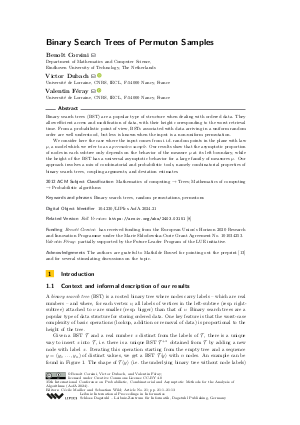Binary Search Trees of Permuton Samples
Authors
Benoît Corsini,
Victor Dubach  ,
Valentin Féray
,
Valentin Féray 
-
Part of:
Volume:
35th International Conference on Probabilistic, Combinatorial and Asymptotic Methods for the Analysis of Algorithms (AofA 2024)
Part of: Series: Leibniz International Proceedings in Informatics (LIPIcs)
Part of: Conference: International Conference on Probabilistic, Combinatorial and Asymptotic Methods for the Analysis of Algorithms (AofA) - License:
 Creative Commons Attribution 4.0 International license
Creative Commons Attribution 4.0 International license
- Publication Date: 2024-07-18
File

PDF
LIPIcs.AofA.2024.21.pdf
- Filesize: 0.89 MB
- 13 pages
Document Identifiers
Related Versions
- Full Version https://arxiv.org/abs/2403.03151
Subject Classification
ACM Subject Classification
- Mathematics of computing → Trees
- Mathematics of computing → Probabilistic algorithms
Keywords
- Binary search trees
- random permutations
- permutons
Metrics
- Access Statistics
-
Total Accesses (updated on a weekly basis)
0PDF Downloads0Metadata Views
Abstract
Binary search trees (BST) are a popular type of structure when dealing with ordered data. They allow efficient access and modification of data, with their height corresponding to the worst retrieval time. From a probabilistic point of view, BSTs associated with data arriving in a uniform random order are well understood, but less is known when the input is a non-uniform permutation. We consider here the case where the input comes from i.i.d. random points in the plane with law μ, a model which we refer to as a permuton sample. Our results show that the asymptotic proportion of nodes in each subtree only depends on the behavior of the measure μ at its left boundary, while the height of the BST has a universal asymptotic behavior for a large family of measures μ. Our approach involves a mix of combinatorial and probabilistic tools, namely combinatorial properties of binary search trees, coupling arguments, and deviation estimates.
Cite As Get BibTex
Benoît Corsini, Victor Dubach, and Valentin Féray. Binary Search Trees of Permuton Samples. In 35th International Conference on Probabilistic, Combinatorial and Asymptotic Methods for the Analysis of Algorithms (AofA 2024). Leibniz International Proceedings in Informatics (LIPIcs), Volume 302, pp. 21:1-21:13, Schloss Dagstuhl – Leibniz-Zentrum für Informatik (2024)
https://doi.org/10.4230/LIPIcs.AofA.2024.21
BibTex
@InProceedings{corsini_et_al:LIPIcs.AofA.2024.21,
author = {Corsini, Beno\^{i}t and Dubach, Victor and F\'{e}ray, Valentin},
title = {{Binary Search Trees of Permuton Samples}},
booktitle = {35th International Conference on Probabilistic, Combinatorial and Asymptotic Methods for the Analysis of Algorithms (AofA 2024)},
pages = {21:1--21:13},
series = {Leibniz International Proceedings in Informatics (LIPIcs)},
ISBN = {978-3-95977-329-4},
ISSN = {1868-8969},
year = {2024},
volume = {302},
editor = {Mailler, C\'{e}cile and Wild, Sebastian},
publisher = {Schloss Dagstuhl -- Leibniz-Zentrum f{\"u}r Informatik},
address = {Dagstuhl, Germany},
URL = {https://drops.dagstuhl.de/entities/document/10.4230/LIPIcs.AofA.2024.21},
URN = {urn:nbn:de:0030-drops-204562},
doi = {10.4230/LIPIcs.AofA.2024.21},
annote = {Keywords: Binary search trees, random permutations, permutons}
}
Author Details
- Department of Mathematics and Computer Science, Eindhoven University of Technology, The Netherlands
Funding
- Corsini, Benoît: has received funding from the European Union’s Horizon 2020 Research and Innovation Programme under the Marie Skłodowska-Curie Grant Agreement No. 101034253.
- Féray, Valentin: partially supported by the Future Leader Program of the LUE initiative.
Acknowledgements
The authors are grateful to Mathilde Bouvel for pointing out the preprint [Grübel, 2023] and for several stimulating discussions on the topic.
References
- Louigi Addario-Berry and Benoît Corsini. The height of Mallows trees. Ann. Probab., 49(5):2220-2271, 2021. URL: https://doi.org/10.1214/20-AOP1503.
- Frédérique Bassino, Mathilde Bouvel, Valentin Féray, Lucas Gerin, Mickaël Maazoun, and Adeline Pierrot. Universal limits of substitution-closed permutation classes. J. Eur. Math. Soc. (JEMS), 22(11):3565-3639, 2020. URL: https://doi.org/10.4171/JEMS/993.
-
Patrick Billingsley. Convergence of probability measures. Wiley Ser. Probab. Stat. Chichester: Wiley, 2nd ed. edition, 1999.

-
Patrick Billingsley. Probability and measure. Anniversary edition. Hoboken, NJ: John Wiley & Sons, 2012.

- Jacopo Borga, Sayan Das, Sumit Mukherjee, and Peter Winkler. Large deviation principle for random permutations. International Mathematics Research Notices, rnad096, 2023. URL: https://doi.org/10.1093/imrn/rnad096.
- Jacopo Borga, Ewain Gwynne, and Xin Sun. Permutons, meanders, and sle-decorated liouville quantum gravity, 2022. Preprint arXiv:2207.02319. URL: https://doi.org/10.48550/arXiv.2207.02319.
- Benoît Corsini. The height of record-biased trees. Random Structures & Algorithms, 62(3):623-644, 2023. URL: https://doi.org/10.1002/rsa.21110.
- Benoît Corsini, Victor Dubach, and Valentin Féray. Binary search trees of permuton samples, 2024. Preprint arXiv:2403.03151. URL: https://doi.org/10.48550/arXiv.2403.03151.
-
Jean-Dominique Deuschel and Ofer Zeitouni. Limiting curves for i.i.d. records. Ann. Probab., 23(2):852-878, 1995.

-
Luc Devroye. A note on the height of binary search trees. Journal of the ACM (JACM), 33(3):489-498, 1986.

- Victor Dubach. Increasing subsequences of linear size in random permutations and the Robinson-Schensted tableaux of permutons, 2023. Preprint arXiv:2307.05768. URL: https://doi.org/10.48550/arXiv.2307.05768.
- Victor Dubach. Locally uniform random permutations with large increasing subsequences. Combinatorial Theory, 3(3), 2023. URL: https://doi.org/10.5070/C63362784.
- Rudolf Grübel. A note on limits of sequences of binary trees. Discrete Mathematics & Theoretical Computer Science, 25(Analysis of Algorithms), 2023. URL: https://doi.org/10.46298/dmtcs.10968.
- Carlos Hoppen, Yoshiharu Kohayakawa, Carlos Gustavo Moreira, Balázs Ráth, and Rudini Menezes Sampaio. Limits of permutation sequences. J. Comb. Theory, Ser. B, 103(1):93-113, 2013. URL: https://doi.org/10.1016/j.jctb.2012.09.003.
- Jonas Sjöstrand. Monotone subsequences in locally uniform random permutations. Ann. Probab., 51(4):1502-1547, 2023. URL: https://doi.org/10.1214/23-AOP1624.
- Eric Slud. Entropy and maximal spacings for random partitions. Z. Wahrscheinlichkeitstheor. Verw. Geb., 41:341-352, 1978. URL: https://doi.org/10.1007/BF00533604.
